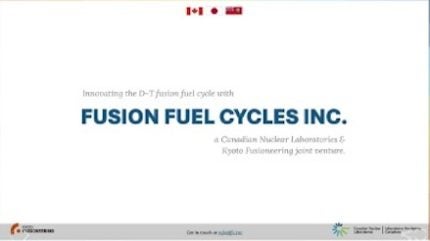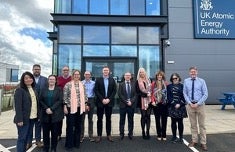
Japan’s Kyoto Fusioneering (KF and Canadian Nuclear Laboratories (CNL) have formed a new joint venture, Fusion Fuel Cycles (FFC). This extends the Strategic Alliance formed between KF and CNL in September 2023, which aims to develop and deploy deuterium-tritium (D-T) fusion fuel cycle technologies. Kyoto Fusioneering was spun out of Kyoto University as Japan’s first fusion start-up in 2019 co-founded by Taka Nagao, Satoshi Konishi, Richard Pearson and Shutaro Takeda.
By marrying the advanced technological and operational capabilities of the two organisations, FFC aims to offer comprehensive solutions that surpass those previously achievable by either entity alone. FFC represents a strategic consolidation of expertise from KF and CNL, dedicated to engineering and delivery of large-scale fuel cycle systems for global fusion development programmes.
The first project under this initiative is UNITY-2, a fuel cycle test facility located at Chalk River Laboratories, scheduled to be commissioned by the end of 2025 and fully operational by mid-2026. UNITY-2, a fusion test loop is seen as complementary to KF’s UNITY-1 (formerly UNITY- Unique Integrated Testing Facility), announced in July 2022 with the stated aim of demonstrating electricity generation using fusion relevant technologies in 2024. While UNITY-1 focuses on the thermal cycle system to harness heat from the fusion core, UNITY-2 focuses on demonstrating the complete fuel cycle.
It will pioneer the full D-T fuel cycle from fuel discharge to purification and supply, demonstrating efficient tritium processing technology in relevant conditions and at relevant rates reducing risks involved in developing a fusion pilot plant (FPP). It will address key risks in an FPP’s tritium processing plant by developing and demonstrating critical enabling technologies. As the first of several planned projects, UNITY-2 sets the stage for subsequent facilities that will support experimental and power plant-scale fusion machines worldwide.
Fred Dermarkar, CEO, Atomic Energy of Canada Limited (AECL), commented: “This new venture is an anchor point for Canada in the growing global fusion industry. As a federal Crown corporation, Atomic Energy of Canada Limited (AECL), receives funding from the Government of Canada to enable the development of nuclear science and technology, and to manage the Government of Canada’s radioactive waste liabilities. Since 2015, AECL has delivered this mandate through a government-owned, contractor-operated model, which means that a private sector organisation, Canadian Nuclear Laboratories (CNL), is responsible for managing and operating AECL’s sites.
“Canada boasts world-renowned capability in in tritium and tritium-handling, as a result of our strong Candu reactor ecosystem. At AECL, we are pleased to be able to leverage this capability to address a critical operation that will be needed for demonstration and deployment of fusion for commercial applications,” said Dermarkar. “We are excited for fusion technology developers to focus on advancing their plasma demonstrations and for them to know, with confidence that the coordinating systems they will need can and will be available to them from FCC. This venture will help build a foundation for growth of the fusion industry in both Canada and Japan, as well as serving our international partners.”






